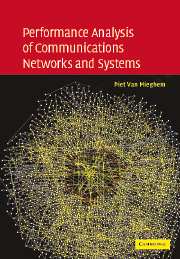Book contents
- Frontmatter
- Contents
- Preface
- 1 Introduction
- Part I Probability theory
- Part II Stochastic processes
- Part III Physics of networks
- 15 General characteristics of graphs
- 16 The Shortest Path Problem
- 17 The effciency of multicast
- 18 The hopcount to an anycast group
- Appendix A Stochastic matrices
- Appendix B Algebraic graph theory
- Appendix C Solutions of problems
- Bibliography
- Index
17 - The effciency of multicast
from Part III - Physics of networks
Published online by Cambridge University Press: 22 February 2010
- Frontmatter
- Contents
- Preface
- 1 Introduction
- Part I Probability theory
- Part II Stochastic processes
- Part III Physics of networks
- 15 General characteristics of graphs
- 16 The Shortest Path Problem
- 17 The effciency of multicast
- 18 The hopcount to an anycast group
- Appendix A Stochastic matrices
- Appendix B Algebraic graph theory
- Appendix C Solutions of problems
- Bibliography
- Index
Summary
The effciency or gain of multicast in terms of network resources is compared to unicast. Specifically, we concentrate on a one-to-many communication, where a source sends a same message to m different, uniformly distributed destinations along the shortest path. In unicast, this message is sent m times from the source to each destination. Hence, unicast uses on average fN (m) = mE [HN] link-traversals or hops, where E[HN] is the average number of hops to a uniform location in the graph with N nodes. One of the main properties of multicast is that it economizes on the number of linktraversals: the message is only copied at each branch point of the multicast tree to the m destinations. Let us denote by HN(m) the number of links in the shortest path tree (SPT) to m uniformly chosen nodes. If we define the multicast gain gN(m) = E[HN(m)] as the average number of hops in the SPT rooted at a source to m randomly chosen distinct destinations, then gN(m) ≤ fN(m). The purpose here is to quantify the multicast gain gN (m). We present general results valid for all graphs and more explicit results valid for the random graph GP(N) and for the k-ary tree. The analysis presented here may be valuable to derive a business model for multicast: “How many customers m are needed to make the use of multicast for a service provider profitable?”
Two modeling assumptions are made. First, the multicast process is assumed to deliver packets along the shortest path from a source to each of the m destinations.
Information
- Type
- Chapter
- Information
- Performance Analysis of Communications Networks and Systems , pp. 387 - 416Publisher: Cambridge University PressPrint publication year: 2006
